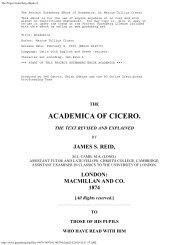From Farm House to the White House - 912 Freedom Library
From Farm House to the White House - 912 Freedom Library
From Farm House to the White House - 912 Freedom Library
Create successful ePaper yourself
Turn your PDF publications into a flip-book with our unique Google optimized e-Paper software.
<strong>Farm</strong> <strong>House</strong> <strong>to</strong> <strong>the</strong> <strong>White</strong> <strong>House</strong>, by William M. Thayer 58<br />
"It may be of service <strong>to</strong> you at some future day," Lawrence continued. "It will do you no harm, surely."<br />
"I am ready for <strong>the</strong> lessons any time," added George. "I have always had a desire <strong>to</strong> know something in that<br />
line."<br />
Adjutant Muse served with Lawrence in <strong>the</strong> war against <strong>the</strong> Spaniards in <strong>the</strong> West Indies, and he was a<br />
competent teacher of <strong>the</strong> manual exercise. It was arranged that he should instruct George in <strong>the</strong> art.<br />
Subsequently, also, Lawrence made arrangements with Monsieur Van Braam <strong>to</strong> instruct George in <strong>the</strong> art of<br />
fencing. He had an idea that dexterity in <strong>the</strong> use of his limbs, as well as fire-arms, would be of future use <strong>to</strong><br />
him. These facts indicate that Lawrence did not expect that his young bro<strong>the</strong>r would become a farmer. There<br />
is traditional evidence that he stated as much <strong>to</strong> George, whose military aspirations were nurtured in <strong>the</strong><br />
Mount Vernon home.<br />
Adjutant Muse encouraged George <strong>to</strong> read certain treaties upon <strong>the</strong> art of war, which he offered <strong>to</strong> loan him.<br />
<strong>From</strong> <strong>the</strong>se volumes he acquired considerable knowledge of <strong>the</strong> <strong>the</strong>ory of tactics, and of <strong>the</strong> evolution of<br />
troops. No previous branch of study had enlisted his interest more thoroughly than did <strong>the</strong>se works upon<br />
military tactics; and we may easily discover <strong>the</strong> design of Providence <strong>to</strong> prepare him in this way <strong>to</strong> act a<br />
conspicuous part in <strong>the</strong> achievement of American independence.<br />
At Mount Vernon George met William Fairfax, whose daughter Lawrence married. He occupied a valuable<br />
estate of his cousin Lord Fairfax, at Belvoir, seven or eight miles from Mount Vernon. He was an English<br />
gentleman of culture and wealth, very much respected by all who knew him.<br />
Mr. Fairfax became very much interested in George, regarding him as a youth of rare, manly virtues.<br />
"He is a man already," he remarked <strong>to</strong> Lawrence; "very mature for one of his years."<br />
"I think so," Lawrence answered, "and I hope <strong>the</strong> way will be opened for his noblest development."<br />
"He must visit us at Belvoir; I should delight <strong>to</strong> have him spend much time in my family," Mr. Fairfax added.<br />
"And I should be pleased <strong>to</strong> have him," responded Lawrence. "He would derive great benefit from it."<br />
"My sons and daughters would find him a very genial companion," continued Mr. Fairfax. "I think <strong>the</strong> benefit<br />
from <strong>the</strong> society of each o<strong>the</strong>r would be mutual."<br />
In this way George was introduced <strong>to</strong> <strong>the</strong> Fairfax family, with whom he spent many of his happiest days and<br />
weeks. It was one of <strong>the</strong> most favorable incidents of his young life when he was welcomed <strong>to</strong> that family, for<br />
<strong>the</strong>re he enjoyed society of culture, where character, and nei<strong>the</strong>r wealth nor honors, ranked highest. Just at that<br />
age he needed <strong>the</strong> influence of education and cultivated manners, and here he found both with <strong>the</strong> sons and<br />
daughters of Mr. Fairfax. Alternately, between this family at Belvoir and his bro<strong>the</strong>r's family at Mount<br />
Vernon, he enjoyed a discipline of social intercourse, better for him, in some respects, than even Mr.<br />
Williams's school.<br />
At Belvoir George met Lord Fairfax, a relative of William Fairfax, recently from England. "He was <strong>the</strong> owner<br />
of immense domains in Virginia," says Mr. Everett. "He had inherited through his mo<strong>the</strong>r, <strong>the</strong> daughter of<br />
Lord Culpepper, <strong>the</strong> original grantee, a vast tract of land, originally including <strong>the</strong> entire terri<strong>to</strong>ry between <strong>the</strong><br />
Po<strong>to</strong>mac and Rappahannock Rivers."<br />
Mr. Everett says of him fur<strong>the</strong>r: "Lord Fairfax was a man of cultivated mind, educated at Oxford, <strong>the</strong> associate<br />
of <strong>the</strong> wits of London, <strong>the</strong> author of one or two papers in <strong>the</strong> Specta<strong>to</strong>r, and an habitué of <strong>the</strong> polite circles of















